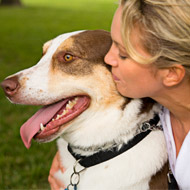
Figures reveal shocking number of domestic abuse crimes in the region
A successful pet fostering scheme that provides support to people fleeing domestic abuse has been extended to the North East of England.
The move comes after police statistics revealed over 54,000 reported incidents of domestic violence in Durham since January 2014 and 30,000 incidents in Northumbria in the past year alone.
Run by Dogs Trust, The Freedom Project works by placing the dog at risk into the home of a volunteer foster carer who will look after them until it is safe to reunite them with their family. Most refuges do not accept pets, so the scheme gives families peace of mind that their animal will be cared for.
The project has been running in Greater London, Yorkshire and Hertfordshire for 12 years and launched in Essex last November. Over this period, it has fostered some 1,100 dogs, helping more than 800 owners.
“Some people find themselves in impossible situations, when the only option to flee from an abusive home would be to give up their dog or leave them behind,” said Diane Muskett, Freedom Project co-ordinator for Yorkshire & North East. “We could not run this project without the help of our amazing foster carers who lovingly care for the dogs in their own homes until they can be reunited with their owners.”
Northumbria’s police and crime commissioner Dame Vera Baird said that she was delighted to fund and support a cause that is so close to her heart.
“Some people find themselves in impossible situations when the only option to flee from an abusive home would be to give up their dog or leave them behind,” she said. "To be able to offer pets a temporary safe-haven through the Freedom Project will no doubt have a positive long-term impact for the animal and those fleeing situations of domestic violence.”
Due to high demand for the service, the Freedom Project is urgently seeking volunteers with experience of caring for dogs. It states that volunteers must be at home during the day and can look after dogs for an average of six months. All the dogs' expenses are covered by Dogs Trust.
If you live in Yorkshire or the North East and would like to find about more, visit www.dogstrustfreedomproject.org.uk. You can also email: freedomproject@dogstrust.org.uk or call: 0800 083 4322.



 RCVS Knowledge has welcomed Professor Peter Cockcroft as editor-in-chief for Veterinary Evidence.
RCVS Knowledge has welcomed Professor Peter Cockcroft as editor-in-chief for Veterinary Evidence.